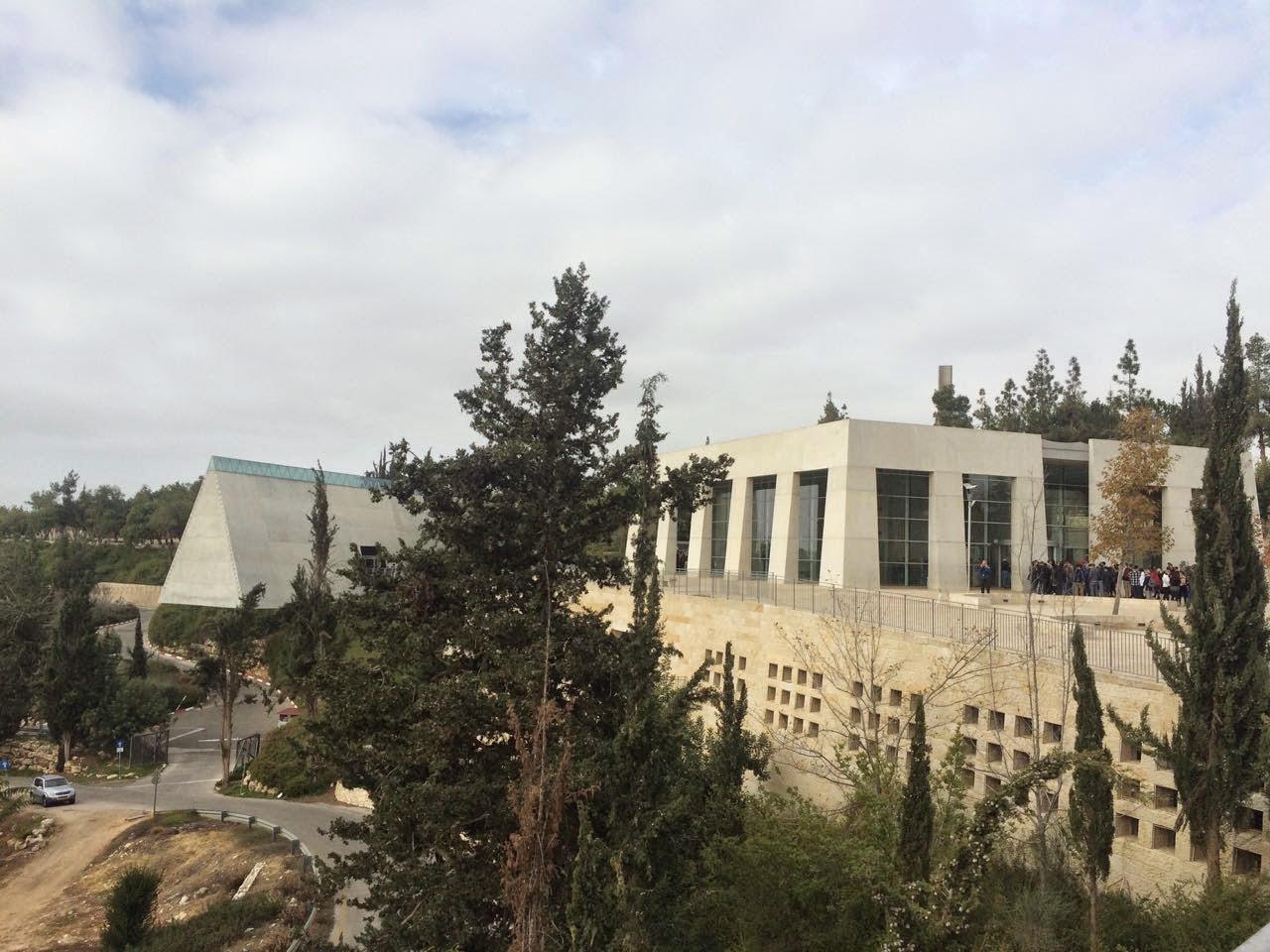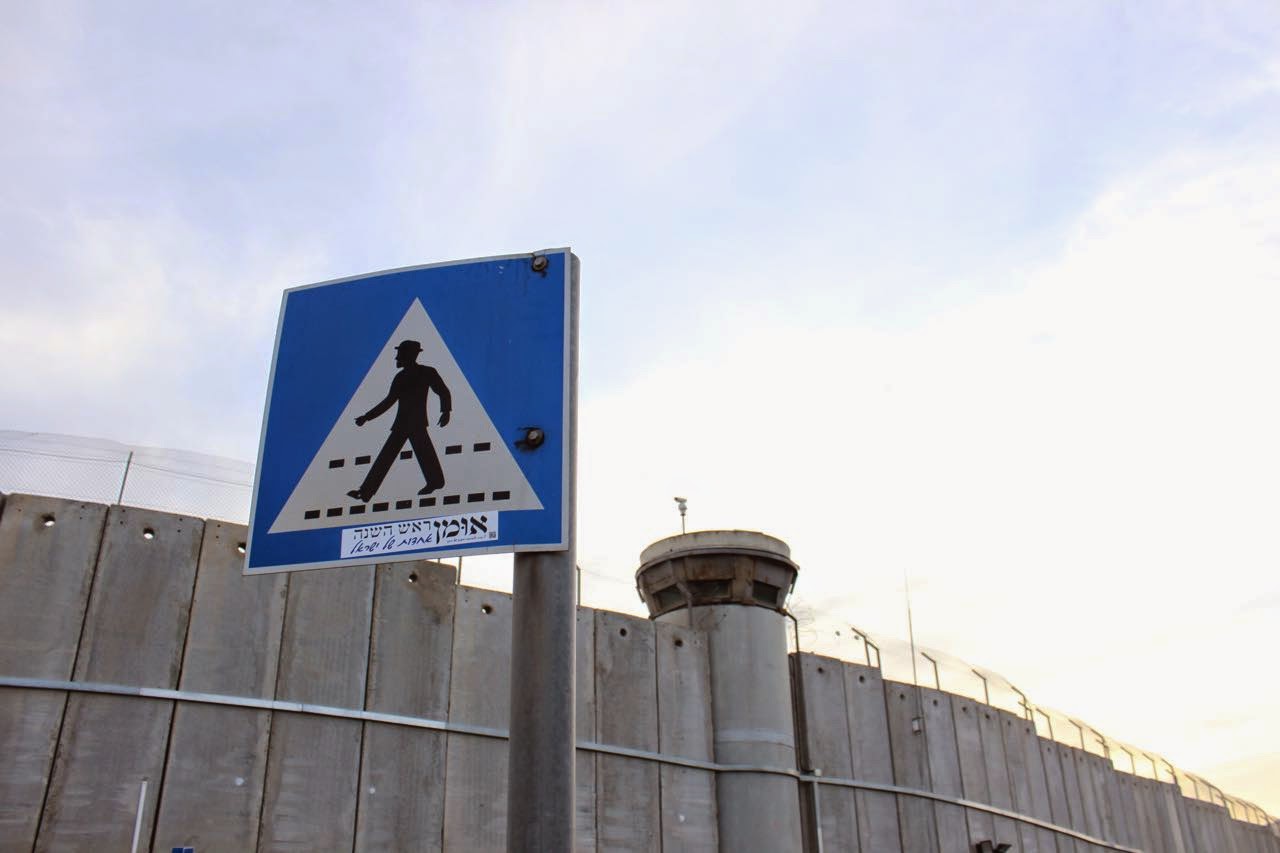Today we spent another day in Jerusalem,
but not in the Old City. We woke up, had
breakfast, and then engaged in a debrief conversation in a conference room at
our hotel. We consistently have really
amazing conversation about racism, culturalism, political activism on our
campuses, and also directly about the Israeli-Palestinian conflict. It is awesome to have 32 college students in
one room from such different backgrounds.
I am constantly challenged to consider the beliefs of others and think
critically of my own tendencies.
After
our (at times heated) debrief, we got on the bus and rode to Yad Vashem, the Holocaust
memorial in Jerusalem. It is built into
the side of Mt. Herzl, where the military cemetery (equivalent of our Arlington
National) is, a cemetery for major leaders of Israel, and finally Theodore Herzl’s
resting place. Herzl was a playwright
and court journalist that worked on the Dreyfus Affair in France, and in
reaction to the anti-Semitism wrote a futuristic fiction book about a Jewish
state in Palestine.
 |
| Triangular prism on the left is the main area of the memorial. |
The
memorial is a triangular prism that cuts through the mountain. Throughout the memorial, you walk from one
end to the other in a zig-zag motion through about a dozen large rooms with all
kinds of artifacts and video footage from the Holocaust. We were not permitted to take photos in the
memorial unfortunately, but that also allowed me to just be steeped in the
emotional toll of the experience.
Obviously I’ve been educated on the Holocaust my whole life, but it
always powerful to experience it again.
A couple of things stood out to me in the memorial. One was Nazi propaganda footage from the
Jewish ghettos in Poland. One thing was
all the videos of children sitting out on the street, already mal-nourished,
before ever going to one of the famous camps.
A specific video showed a brother and sister where the sister was
continuously touching the face of the her brother, trying to wake him. I’m not sure I had ever seen this footage
before and it forced me to look down in shame.
 |
| I snuck a shot of this piece of art before we entered the memorial. |
Another
powerful moment for me was the story of
a Polish family by the name of Uma.
The parents of the Uma family had six kids for their own, but in the
midst of the Nazi’s ghetto creation and concentration of the Jews, the Umas
decided to commit to hiding and caring for six Jewish children in addition to
their own children. Living in a small
town, word eventually spread, and the SS were informed of this hiding. One day, the SS busted into the home, not
even giving the children time to hide themselves. The SS lined up all 12 kids and told the
parents to pick out their own children to save them. The Umas remained silent. The SS asked once more, but the Umas still
refused to elevate the value of any one child’s life over another. Finally, the whole family paid the ultimate
price.
I
had never heard this story from the Holocaust.
I’m not exactly sure why it was so personally powerful to me, but I
believe I related the story to one of my siblings that participates in the
foster care system. I imagined this
circumstance as applied to the lives of her and her husband, and I was so
thankful for the Umas. Their decision to
honor the life of each child the same demonstrates a kind of love that incurs
extreme world-change but on a personal level.
I hope for this kind of love in my own life’s work.
 |
| This is a picture from the exit of the memorial. A very somber moment for our group. |
We left the
memorial and went to lunch in a bustling nearby market. As promised by many friends that have been to
Israel, the food here is absolutely amazing.
I find it impossible to deny myself shawarma. Haha
 |
| Abbie (UNF) and I feeling like rockstars. Cool. |
 |
| Maddie (Gonzaga) holding up the map for our lesson. |
After the market,
we got on the bus and Iftah gave us a tour of the Security Barrier that divides
the land of Israel from the “occupied” territory of the West Bank. The barrier is a large wall at some parts,
just a fence at others. Some compare it
to the Berlin Wall, or a contributor the “apartheid state” aspect of
Israel. Palestinians living on the
outside of the wall cannot readily get access to Israeli hospitals or
schools. This means that the quality of
life for Palestinians suffers greatly from the barrier, as Palestine is not
really a fully developed state with complete infrastructure, but just an
occupied territory of the state of Israel.
We stopped at multiple checkpoints and discussed the difference of
emotions towards the wall depending on which side you live. The benefits to Israelis include reduced
direct acts of terrorism in Jerusalem and mainland Israel.
 |
| The Security Barrier from a distance. |


 |
| Iftah telling us about the other side of the wall being graffitied and defaced by the Palestinians. |
Our final meeting
for the day was with a man named Bassem Eid.
Eid is a Palestinian that leads an organization called the Palestinian
Human Rights Monitoring Group. His
organization has worked for multiple decades to defend the human rights of
Palestinians against oppressive Israeli legislation as well as (most recently
according to him) against oppressive Palestinian legislation. His perspective was interesting, as he is
Pro-Palestinian and not Anti-Israel, which seem to be a common pair. Most of his talk was more about combatting
Palestinian self-oppression rather than Israeli oppression. After talks like this, I always draw near to
my friends in the group that are more sympathetic towards Palestinians than
Israelis. I love hearing their opinions,
as they often challenge my somewhat optimistic views. They appreciated some aspects of the
presentation while disagreeing with other points.
After this
meeting, we had a traditional Shabbat (Sabbath) dinner and Oneg Shabbat. Oneg Shabbat is a time of fellowship after
dinner where everyone unplugs and just enjoys each other’s company. We sang songs, played games, and even had a
small “fashion show.” Pictures/technology were off limits. Once Shabbat was
over, we dispersed, reconnected to wifi, and then eventually went to bed!












No comments:
Post a Comment